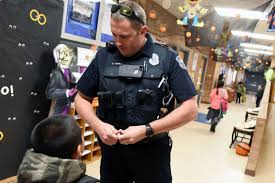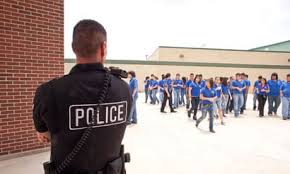Without a doubt the failure of law enforcement to respond accurately, swiftly and empathetically to prevent the tragic shooting death of 19 students & 2 teachers in May 2022 at Robb Elementary School in Uvalde, Texas is not debatable. They failed those precious students & lives.
However, the Uvalde Foundation For Kids asserts that this reality should not deter, nor confuse, the general public, nor school communities across this nation; from seeing the true value of the right law enforcement presence in our schools through School Resource Officers.
It is more than just, "Cops in schools "
We present the below detailed brief, by John Risiak, which we have added upon in a full PDF VERSION offering what we hope is further insight into our foundation's spport for SRO'S in all our nations public schools... Within it, as seen in the highlights below; an organized, empathetic & detailed approach to "School Policing," can both prevent school violence BEFORE IT HAPPENS & can do so by helping address & change the culture of school violence BEFORE A WEAPON IS EVER PICKED UP OR CONFLICT STARTED.
_________
School Resource Officers: Benefits and Challenges
(John Rosiak, Prevention Partnerships)
With the continuation of high profile school shootings in the United States, and growing concern about school violence in countries across the world, the issue of whether and how to engage law enforcement in schools has been raised to a new level of discussion.
Communities must decide whether they want to employ police in schools in the capacity of School Resource Officers (SROs).
If so, these communities must figure out how they go about it in the most effective way by developing positive relationships with students and collaboration with educators and mental health professionals to proactively address school safety issues and divert at-risk students from the juvenile justice system.
Implementing effective SRO programs that support the positive development of youth is an essential part of youth justice reform.
This article in its full PDF VERSION available by request at uvaldefoundationforkids@gmail.com presents the SRO model of school-based law enforcement (SBLE), discussing the SRO’s role as an educator, informal counselor, and proactive law enforcer. It presents the potential benefits and challenges of school-based law enforcement, and outlines the key steps to creating an effective SRO program through proper selection, training, and governance.
___________
If students and educators are to achieve their full potential, schools must be safe and feel safe. Students who report feeling safe in school are more engaged in class, have higher academic achievement, and have lower rates of absenteeism, truancy, and behavioral issues. Educators also benefit from safe schools.
Those educators who report feeling safe in school are better able to focus on academics, are more likely to remain in their positions, and are better equipped to teach and support students. Simply put, feeling safe in school is connected to achieving educational outcomes for students.
Many communities seek the help of law enforcement to promote school safety and protect schools from violence. SRO programs that are implemented and sustained through a well-conceived, organized and comprehensive process can help prevent school-based violence, connect at-risk students to needed services, divert youth from juvenile court, and create safe, secure, and peaceful school environments.
Effective school-based law enforcement programs require more than simply assigning officers to schools. More established SRO programs are built on careful selection of the right officer, and training that SRO in well-defined roles and responsibilities. More robust school-based law enforcement programs involve a comprehensive agreement between the school and the law enforcement agency that fosters collaboration, communication, and ongoing evaluation.




